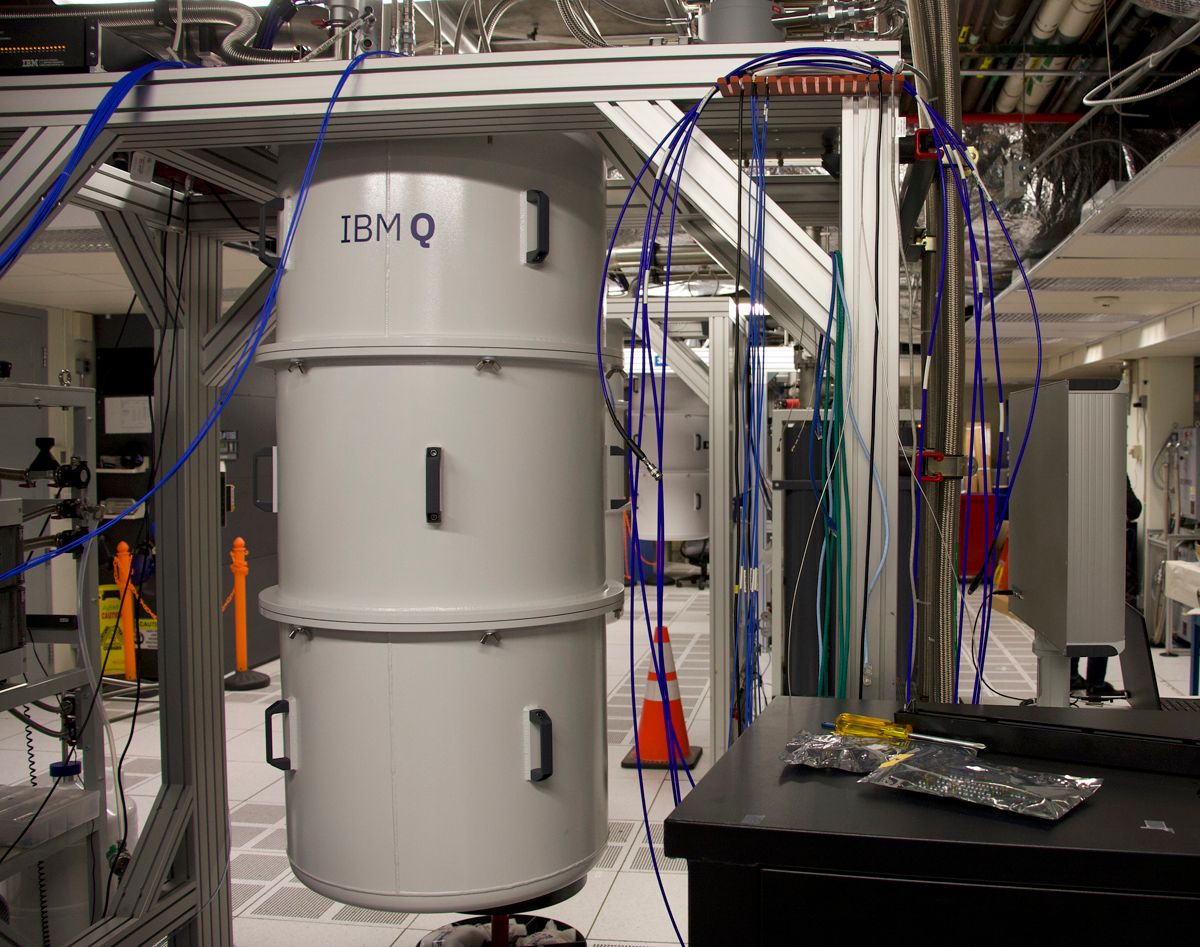Quantum computing is emerging as a transformative force in the realm of technology, promising unparalleled processing speeds and capabilities that could reshape various industries. From optimizing logistics to accelerating scientific breakthroughs, the potential applications of quantum computing are vast and diverse. As we stand on the brink of this new era, it is imperative to understand the key takeaways from the current state of quantum computing and its trajectory towards becoming the next frontier in technology.
Key Takeaways
- Quantum computing is poised to revolutionize industries by optimizing logistics, enhancing battery development, and improving financial predictions.
- Innovations in quantum computing algorithms and data structures are granting companies a competitive edge and fostering growth and innovation.
- The NVIDIA Quantum Cloud is a significant step in democratizing access to quantum technologies, enabling researchers worldwide to explore quantum computing.
- Quantum computing is driving a new era of research and innovation, with potential breakthroughs in drug discovery, energy-efficient electronics, and machine learning.
- Software development is on the cusp of a quantum era, requiring a new coding paradigm and preparation for quantum capabilities that surpass AI.
Quantum Computing in Practice: Building Next-Gen Applications

Optimizing Logistics and Delivery
Quantum computing is poised to revolutionize the logistics and delivery sector by offering unprecedented optimization capabilities. Quantum algorithms can analyze and optimize complex delivery routes, considering a multitude of variables in a fraction of the time it takes using classical computing methods. This leads to significant cost savings and efficiency improvements.
- Enhanced Route Planning: Quantum computing can quickly determine the most efficient delivery paths, reducing fuel consumption and delivery times.
- Inventory Management: By predicting demand more accurately, businesses can optimize stock levels, minimizing waste and storage costs.
- Dynamic Scheduling: Quantum technology enables real-time adjustments to delivery schedules, accommodating last-minute changes and disruptions.
The ability to process vast datasets and run optimization scenarios simultaneously marks a transformative step in managing logistics networks. As quantum computing matures, the logistics industry stands to gain from these advanced optimization techniques, ensuring faster, greener, and more reliable delivery services.
Accelerating Electric Vehicle Battery Development
Quantum computing is poised to revolutionize electric vehicle (EV) battery development. By simulating complex chemical reactions at the quantum level, researchers can identify new materials and battery designs that could lead to longer ranges and faster charging times. This is not just theoretical; quantum simulations are already enhancing traditional computing approaches to scientific discovery.
- Material Discovery: Quantum algorithms can predict the properties of new battery materials before they are synthesized.
- Performance Optimization: Simulations can help improve battery life and charging rates.
- Cost Reduction: Identifying more efficient materials can lower the cost of batteries.
Quantum computing’s ability to handle vast datasets and complex variables can significantly shorten the research and development cycle for EV batteries, making sustainable transportation more accessible.
As the technology matures, the integration of quantum computing in EV battery development will become more prevalent, offering a competitive edge to those who adopt it early.
Enhancing Financial Market Predictions
The integration of quantum computing into financial markets is poised to revolutionize the way predictions are made. With the power of quantum computing behind it, stochastic modeling can provide faster and more accurate predictions about the market. This could lead to a significant advantage for traders and financial analysts who rely on predictive models to make informed decisions.
The potential benefits of quantum-enhanced financial predictions include:
- Improved accuracy of market forecasts
- Faster analysis of complex financial systems
- Enhanced risk assessment and management
Embracing quantum computing in finance could mean the difference between staying ahead of market trends and falling behind.
As the technology matures, we can expect to see a range of financial products and services that leverage quantum computing for better performance. For instance, Enhanced Options Income ETFs like $QQQY and $JEPY may benefit from more sophisticated pricing algorithms, while investors could gain insights from quantum-powered market analysis tools.
Overcoming Technical Challenges
The journey towards fully harnessing quantum computing is fraught with technical hurdles. Managing qubit decoherence is one of the most significant challenges, as it requires maintaining the fragile quantum states essential for computation. Developing robust error correction techniques is equally critical to ensure reliable results from quantum calculations.
Another major obstacle is scalability. Current quantum systems are limited in the number of qubits they can effectively manage, which restricts the complexity of problems they can solve. This is compounded by the need for continuous hardware and software advancements to keep pace with the growing demands of quantum algorithms.
The integration of quantum and classical systems presents its own set of challenges, but it is a crucial step for the practical application of quantum computing.
Lastly, the environmental impact of quantum computing cannot be overlooked. The extreme conditions required for qubit stability, such as near absolute zero temperatures, demand significant energy resources. Companies and researchers are actively seeking solutions to these issues, fostering a collaborative environment that is vital for progress.
The Rise of Quantum Computing

Revolutionizing Algorithms and Data Structures
Quantum computing is transforming the landscape of computational science by introducing new paradigms in algorithms and data structures. Quantum-inspired classical algorithms are emerging, which mimic the computational abilities of quantum systems, offering significant advantages in fields like machine learning.
Quantum computing’s impact on data structures is equally profound. Traditional constructs such as arrays and linked lists are being reimagined to accommodate the complexities that quantum problems present. This shift is not just theoretical; it’s paving the way for practical applications that can process data with unprecedented efficiency.
The integration of quantum principles in computing is not a distant future—it’s an unfolding reality. Companies that harness these innovations will not only gain a competitive edge but will also redefine what’s possible in technology.
As the technology matures, the anticipation of a quantum advantage—where quantum computers outperform classical ones—grows. This is not just about speed; it’s about the ability to solve problems that were once considered intractable. The implications for industries across the board are staggering, from security protocols to data analysis.
Gaining Competitive Edge through Innovation
In the rapidly evolving tech landscape, companies that harness quantum computing are setting the stage for a new wave of innovation. This paradigm shift not only promises to solve previously intractable problems but also offers a significant competitive advantage in the marketplace.
- Quantum computing enables the development of new products and services by providing solutions to complex simulations and optimizations.
- It facilitates the creation of secure communication systems through quantum cryptography, ensuring a higher level of data protection.
- By accelerating data analysis, businesses can make more informed decisions, driving efficiency and profitability.
Embracing quantum computing is not just about staying ahead; it’s about redefining the boundaries of what’s possible in technology and business.
As the race to quantum supremacy heats up, companies are investing heavily in research and development. Those who succeed in integrating quantum technologies into their operations will likely emerge as leaders in their respective fields, shaping the future of their industries.
NVIDIA Quantum Cloud: Democratizing Access to Quantum Technologies
The unveiling of NVIDIA Quantum Cloud marks a significant milestone in the democratization of quantum technologies. By leveraging the robust CUDA-Q™ quantum computing platform, NVIDIA is empowering researchers and developers to innovate at an unprecedented scale. This cloud-based microservice is a game-changer, offering a seamless environment for building and testing quantum algorithms and applications.
NVIDIA Quantum Cloud is not just a theoretical concept; it’s a practical tool that’s readily available for quantum computing pioneers. By signing up for early access, innovators can gain a competitive edge in the quantum computing race. The platform’s integration with major cloud providers, including Amazon Web Services, Google Cloud, Oracle Cloud Infrastructure, and Microsoft Azure, ensures that users have the flexibility to operate within their preferred cloud ecosystem.
The NVIDIA Quantum Cloud is a testament to the company’s commitment to advancing quantum research. It stands as a beacon for scientists worldwide, inviting them to explore the vast potential of quantum computing.
Tim Costa’s vision of a collaborative quantum future is embodied in the NVIDIA Quantum Cloud. It’s a call to the world’s brightest minds to join forces and unlock the mysteries of quantum computing. With the support of NVIDIA’s platform, the quantum era is within reach for every aspiring scientist and developer.
Quantum Computing: A New Era of Research and Innovation

Breakthroughs in Drug Discovery
The convergence of quantum computing and early drug discovery is poised to revolutionize the pharmaceutical industry. By integrating quantum computing with traditional high-performance systems, researchers can perform precise physical simulations that are critical for identifying promising compounds. This synergy accelerates the process from initial discovery to preclinical testing, potentially reducing the time and cost associated with bringing new drugs to market.
Quantum simulations enable the exploration of complex chemical reactions and biological processes at a granular level. This capability is crucial for developing more effective treatments and understanding disease mechanisms.
Quantum computing’s ability to handle complex problem solving extends to the realm of drug discovery. It allows for the analysis of vast chemical spaces and the prediction of molecular behavior, which classical computers struggle with. The implications for material science are equally significant, with the potential to discover new catalysts and materials that could transform industries.
Advancements in Energy-Efficient Electronics
The pursuit of energy-efficient electronics is reaching new heights with the advent of quantum computing. Quantum processors operate at incredibly low temperatures, leading to minimal energy expenditure during computations. This starkly contrasts with traditional computers that generate significant heat and consume more power.
The synergy between quantum speedup and low energy consumption heralds a future where large-scale quantum computers could outperform classical supercomputers, not only in speed but also in energy efficiency.
Quantum advancements promise to revolutionize not just computational capabilities but also the sustainability of technology. As we stand on the brink of this new era, the implications for industries like energy storage and machine learning are profound, potentially leading to more sustainable solutions across the board.
Machine Learning Innovations for Sustainability and Image Processing
Quantum computing is poised to drive innovation and breakthroughs in machine learning (ML), particularly in sustainability and image processing. By leveraging quantum algorithms, ML models can be enhanced, leading to faster training times and more precise predictions. This is especially relevant in image recognition and natural language processing, where quantum computing can process information exponentially faster than classical computers.
Quantum-enhanced machine learning algorithms are not just theoretical; they are becoming a reality. These algorithms excel at solving optimization problems that are fundamental to ML tasks such as clustering, classification, and anomaly detection. The table below outlines the potential improvements in key areas of machine learning with the advent of quantum computing:
| ML Task | Classical Computing | Quantum Computing |
|---|---|---|
| Training Time | Hours/Days | Minutes/Seconds |
| Prediction Accuracy | High | Very High |
| Optimization Problems | Solvable | More Efficiently Solved |
The synergy between quantum computing and machine learning heralds a new chapter in technology. It promises not only to enhance current applications but also to unlock new possibilities that were previously beyond our reach.
As we look to the future, the integration of quantum computing with machine learning is expected to be a game-changer. It will not only revolutionize existing domains but also pave the way for novel applications that can tackle complex global challenges.
Revolutionizing Algorithms and Data Structures with Quantum Computing

Exceeding Classical Computing Speeds
Quantum computing is poised to redefine the landscape of computational speed. At the heart of this technology lies the principle of superposition, which enables quantum computers to process information in ways that are fundamentally different from classical systems. This distinction is not merely theoretical; it translates into practical advantages that are set to transform a myriad of industries.
The promise of quantum computing is not just in its speed but in its ability to handle complex problems that are currently intractable for classical computers. For instance, quantum algorithms are designed to exploit quantum mechanics to perform calculations at an exponentially faster rate, making them well-suited for tasks that require high-speed computation and enhanced problem-solving capabilities.
While the full potential of quantum computing has yet to be realized, the advancements in processing power and problem-solving capabilities suggest a future where quantum computers surpass classical ones in significant ways.
Despite the enthusiasm, it’s important to note that quantum computing is still in its nascent stages. Researchers are diligently working to overcome the technical hurdles that prevent quantum computers from achieving their full potential. As the technology matures, we can expect to see quantum computing redefine what is possible in computation, offering unprecedented speeds and capabilities.
Solving Computationally Intensive Problems
Quantum computing is poised to transform our approach to computationally intensive problems. By leveraging the superposition and entanglement of qubits, quantum computers can process vast amounts of data and perform complex calculations at unprecedented speeds. This capability is particularly advantageous in fields where traditional algorithms struggle due to the sheer scale of data or the complexity of the problem.
- Cryptography: Quantum algorithms could break current encryption methods, necessitating new cryptographic protocols.
- Drug Discovery: Simulating molecular interactions to identify potential drugs becomes feasible with quantum computing.
- Optimization: Industries can optimize logistics, financial portfolios, and production processes more effectively.
The potential of quantum computing to solve problems that are currently intractable for classical computers could redefine the landscape of computational science. The ability to quickly navigate through a multitude of solutions and identify the optimal one is a game-changer for many sectors.
While the promise of quantum computing is immense, it is not without its challenges. Error correction, scalability, and the environmental impact of maintaining quantum states are areas that require ongoing research and innovation. The journey ahead is complex, but the rewards could be transformative for technology as we know it.
Anticipating the Quantum Advantage
The anticipation of a quantum advantage is driving innovation across various sectors. Quantum computing promises to outperform classical systems in certain tasks, offering an algorithmic advantage that could redefine problem-solving paradigms. As we stand on the brink of this new era, it’s crucial to understand the potential impacts on industries and research.
The quantum advantage refers to the point where quantum computers perform tasks more efficiently than classical computers, marking a significant milestone in computational history.
Here are some of the anticipated benefits of quantum computing:
- Enhanced Speed: Quantum algorithms can perform calculations much faster than classical algorithms.
- Improved Accuracy: The probabilistic nature of quantum mechanics leads to more reliable results.
- Increased Scalability: Ideal for processing large amounts of data and solving computationally intensive tasks.
While the excitement is palpable, the journey to achieving quantum advantage is fraught with challenges. Software engineers and developers are tasked with navigating a landscape that is fundamentally different from classical computing, requiring new approaches and methodologies.
Quantum Computing: Beyond Conventional Boundaries

Surpassing AI with Quantum Capabilities
Quantum computing is on the brink of surpassing artificial intelligence (AI) in terms of computational power and efficiency. This leap forward is due to quantum computers’ ability to process and analyze data at an unprecedented scale, leveraging the phenomena of superposition and entanglement.
The synergy between quantum computing and AI is set to redefine our approach to technology, with quantum-enhanced algorithms poised to make machine learning models more efficient, accurate, and capable of handling complex tasks.
Quantum computers are not just faster; they are fundamentally different. They can solve certain optimization problems integral to machine learning, such as clustering and classification, much more efficiently than classical computers. Here’s a glimpse of the potential improvements:
- Faster training of machine learning models
- More accurate predictions and outcomes
- Enhanced capability for complex problem-solving
As we approach the era of quantum supremacy, where quantum computers can perform calculations beyond the reach of the most powerful supercomputers, the implications for AI and software development are profound. The integration of quantum computing into AI could lead to advancements that currently seem like science fiction.
Embracing a New Coding Paradigm
Quantum computing represents a new frontier in the world of coding, offering unprecedented computing power and capabilities that have the potential to revolutionize software development as we know it. As this cutting-edge technology continues to advance, developers must prepare themselves for a new era of programming that will require a shift in mindset and approach.
For coders, the rise of quantum computing brings both challenges and opportunities. As the technology becomes more widely available and accessible, developers will need to adapt to a new programming paradigm in order to take full advantage of the power of quantum computers. Quantum programming languages, such as Q#, Qiskit, and Silq, have already been developed to enable coders to write algorithms that can be executed on quantum hardware.
It is crucial for developers to start familiarizing themselves with quantum computing now in order to stay ahead of the curve and remain competitive in the rapidly evolving tech landscape.
- Quantum computing has the potential to revolutionize software development across multiple industries.
- Developers need to adapt to new programming paradigms to take advantage of quantum computing technology.
- Quantum computing offers new possibilities for innovation and discovery in software development.
Preparing for the Quantum Era in Software Development
As the quantum era dawns, software developers are on the cusp of a transformative shift. Quantum computing represents a new frontier in the world of coding, offering unprecedented computing power and capabilities that have the potential to revolutionize software development. To harness this power, developers must adapt to new programming paradigms and embrace the vast potential of quantum technologies.
The implications for software development are profound, with quantum supremacy opening up a world of possibilities for creating new algorithms, optimizing code, and pushing computational boundaries. It is crucial for developers to start familiarizing themselves with quantum computing now to remain competitive in the rapidly evolving tech landscape.
By embracing quantum computing and exploring its potential applications, coders can position themselves at the forefront of the next wave of innovation in software development.
Here are some key takeaways for software engineers:
- Quantum computing has the potential to revolutionize software development across multiple industries.
- Developers need to adapt to new programming paradigms to take advantage of quantum computing technology.
- Quantum computing offers new possibilities for innovation and discovery in software development.
Embracing the Quantum Leap
In summary, quantum computing stands on the precipice of reshaping the technological landscape, offering unparalleled processing power and the ability to tackle problems once deemed insurmountable. As we stand at the threshold of this new era, the implications for industries ranging from healthcare to cybersecurity are profound. The journey ahead is filled with both challenges and opportunities, requiring a collective effort from the brightest minds in science and engineering. By embracing quantum computing, we not only unlock a new realm of computational possibilities but also pave the way for innovations that could redefine the future.
Frequently Asked Questions
What is quantum computing and how does it differ from classical computing?
Quantum computing is a type of computing that uses quantum bits or qubits, which can exist in multiple states simultaneously, thanks to the principles of superposition and entanglement. This allows quantum computers to perform certain calculations much faster than classical computers, which use bits that are either 0 or 1.
In what ways can quantum computing optimize logistics and delivery?
Quantum computing can optimize logistics and delivery by calculating the most efficient routes and schedules. It can process vast amounts of data to determine the quickest and most cost-effective paths for shipping, thus potentially reducing delivery times and costs.
How might quantum computing accelerate electric vehicle battery development?
Quantum computing can speed up the development of electric vehicle batteries by simulating and analyzing materials at the quantum level. This can lead to the discovery of new materials and battery designs that charge faster, last longer, and are more environmentally friendly.
What role does quantum computing play in financial market predictions?
Quantum computing can enhance financial market predictions by analyzing complex market data and running simulations at unprecedented speeds. This can help financial institutions make more accurate predictions and risk assessments, leading to better investment strategies.
What are some of the technical challenges that need to be overcome for quantum computing to reach its full potential?
Technical challenges for quantum computing include creating stable qubits that can maintain their state without interference, scaling up the number of qubits for practical applications, error correction, and developing new quantum algorithms and software.
How is NVIDIA Quantum Cloud democratizing access to quantum technologies?
NVIDIA Quantum Cloud is democratizing access to quantum technologies by providing scientists and developers around the world with cloud-based access to quantum computing resources. This allows a wider range of individuals and organizations to explore and innovate with quantum computing without the need for their own quantum hardware.





